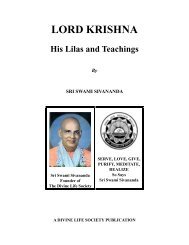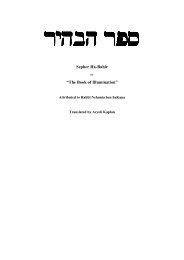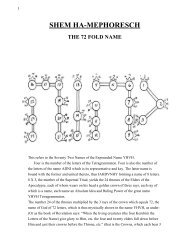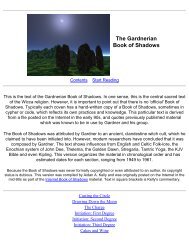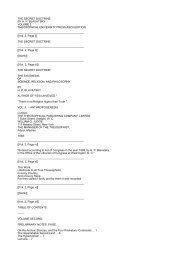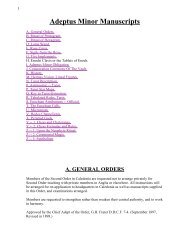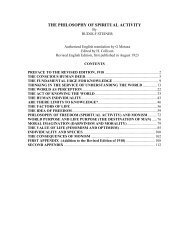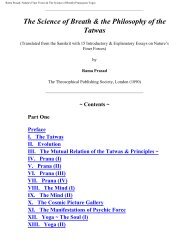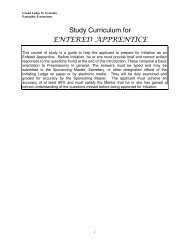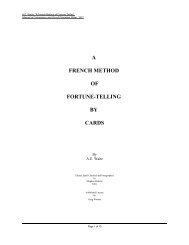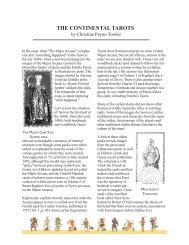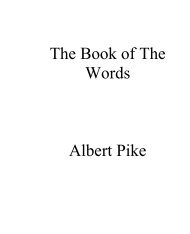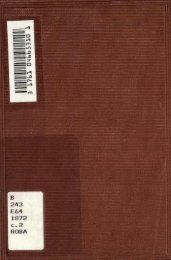You also want an ePaper? Increase the reach of your titles
YUMPU automatically turns print PDFs into web optimized ePapers that Google loves.
The Gods Of The <strong>Book</strong> Of The <strong>Dead</strong>.<br />
makes her <strong>the</strong> mo<strong>the</strong>r <strong>of</strong> Anpu or Anubis by Osiris. In Egyptian texts Anpu is called <strong>the</strong> son <strong>of</strong> Ra.[2] In<br />
religious texts Nephthys is made to be <strong>the</strong> companion <strong>of</strong> Isis in all her troubles, and her grief for her<br />
bro<strong>the</strong>r's death is as great as that <strong>of</strong> his wife.<br />
Anpu, or Anubis, <strong>the</strong> son <strong>of</strong> Osiris or Ra, sometimes by Isis and sometimes by Nephthys, seems to<br />
represent as a nature god ei<strong>the</strong>r <strong>the</strong> darkest part <strong>of</strong> <strong>the</strong> twilight or <strong>the</strong> earliest dawn. He is depicted ei<strong>the</strong>r<br />
in human form with a jackal's head, or as a jackal. In <strong>the</strong> legend <strong>of</strong> Osiris and Isis, Anubis played a<br />
prominent part in connexion with <strong>the</strong> dead body <strong>of</strong> Osiris, and in papyri we see him standing as a guard<br />
and protector <strong>of</strong> <strong>the</strong> deceased lying upon <strong>the</strong> bier; in <strong>the</strong> judgment scene he is found as <strong>the</strong> guard <strong>of</strong> <strong>the</strong><br />
balance, <strong>the</strong> pointer <strong>of</strong> which he watches with great diligence. He became <strong>the</strong> recognized god <strong>of</strong> <strong>the</strong><br />
sepulchral chamber, and eventually presided over <strong>the</strong> whole <strong>of</strong> <strong>the</strong> "funeral Mountain." He is always<br />
regarded as <strong>the</strong> messenger <strong>of</strong> Osiris.<br />
Ano<strong>the</strong>r form <strong>of</strong> Anubis was <strong>the</strong> god Ap-uat, <strong>the</strong> ### <strong>of</strong> <strong>the</strong> pyramid texts,[3] or "Opener <strong>of</strong> <strong>the</strong> ways,"<br />
who also was depicted in <strong>the</strong> form <strong>of</strong> a jackal; and <strong>the</strong> two gods are <strong>of</strong>ten confounded. On sepulchral<br />
stelæ and o<strong>the</strong>r monuments two jackals are frequently depicted; one <strong>of</strong> <strong>the</strong>se represents Anubis, and <strong>the</strong><br />
o<strong>the</strong>r Ap-uat, and <strong>the</strong>y probably have some connexion with <strong>the</strong> nor<strong>the</strong>rn and sou<strong>the</strong>rn parts <strong>of</strong> <strong>the</strong><br />
funereal world. According to M. Maspero, <strong>the</strong> god Anubis led <strong>the</strong> souls <strong>of</strong> <strong>the</strong> dead to <strong>the</strong> Elysian Fields<br />
in <strong>the</strong> Great Oasis.[4]<br />
Among <strong>the</strong> primeval gods are two, Hu and Saa who are seen in <strong>the</strong> boat <strong>of</strong> <strong>the</strong> sun at <strong>the</strong> creation. They<br />
are <strong>the</strong> children <strong>of</strong> Tmu or Tmu-Ra, but <strong>the</strong> exact part which <strong>the</strong>y play as nature gods has not yet, it<br />
seems, been satisfactorily made out. The first mention <strong>of</strong> <strong>the</strong>m in <strong>the</strong> pyramid texts records <strong>the</strong>ir<br />
subjugation by <strong>the</strong> deceased,[5] but in <strong>the</strong> Theban <strong>Book</strong> <strong>of</strong> <strong>the</strong> <strong>Dead</strong><br />
[1. De Iside et Osiride, § 14.<br />
2. See Lanzone, op. cit., p. 65.<br />
3 Pyramid <strong>of</strong> Unas, l. 187.<br />
4 See Le Nom antique de la Grande-Oasis (in Journal Asiatique, IX e Série, to i., pp. 233-40).<br />
6 ###. Pyramid <strong>of</strong> Unas, l. 439.]<br />
{p. cxviii}<br />
<strong>the</strong>y appear among <strong>the</strong> company <strong>of</strong> <strong>the</strong> gods who are present when <strong>the</strong> soul <strong>of</strong> <strong>the</strong> deceased is being<br />
weighed in <strong>the</strong> balance.<br />
Tehuti or Thoth represented <strong>the</strong> divine intelligence which at creation uttered <strong>the</strong> words that were carried<br />
into effect by Ptah and Khnemu. He was self produced, and was <strong>the</strong> great god <strong>of</strong> <strong>the</strong> earth, air, sea and<br />
sky; and he united in himself <strong>the</strong> attributes <strong>of</strong> many gods. He was <strong>the</strong> scribe <strong>of</strong> <strong>the</strong> gods, and, as such, he<br />
was regarded as <strong>the</strong> inventor <strong>of</strong> all <strong>the</strong> arts and sciences known to <strong>the</strong> Egyptians; some <strong>of</strong> his titles are<br />
"lord <strong>of</strong> writing," "master <strong>of</strong> papyrus," "maker <strong>of</strong> <strong>the</strong> palette and <strong>the</strong> ink-jar," "<strong>the</strong> mighty speaker," "<strong>the</strong><br />
sweet tongued"; and <strong>the</strong> words and compositions which he recited on behalf <strong>of</strong> <strong>the</strong> deceased preserved<br />
<strong>the</strong> latter from <strong>the</strong> influence <strong>of</strong> hostile powers and made him invincible in <strong>the</strong> "o<strong>the</strong>r world." He was <strong>the</strong><br />
god <strong>of</strong> right and truth, wherein he lived, and whereby he established <strong>the</strong> world and all that is in it. As <strong>the</strong><br />
chronologer <strong>of</strong> heaven and earth, he became <strong>the</strong> god <strong>of</strong> <strong>the</strong> moon; and as <strong>the</strong> reckoner <strong>of</strong> time, he<br />
obtained his name Tehuti, i.e., "<strong>the</strong> measurer"; in <strong>the</strong>se capacities he had <strong>the</strong> power to grant life for<br />
http://www.sacred-texts.com/egy/ebod/ebod09.htm (8 <strong>of</strong> 19) [8/10/2001 11:23:59 AM]



